当代商学概论 1
- 格式:ppt
- 大小:533.50 KB
- 文档页数:16

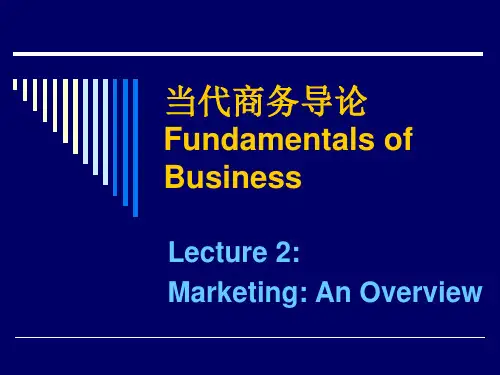
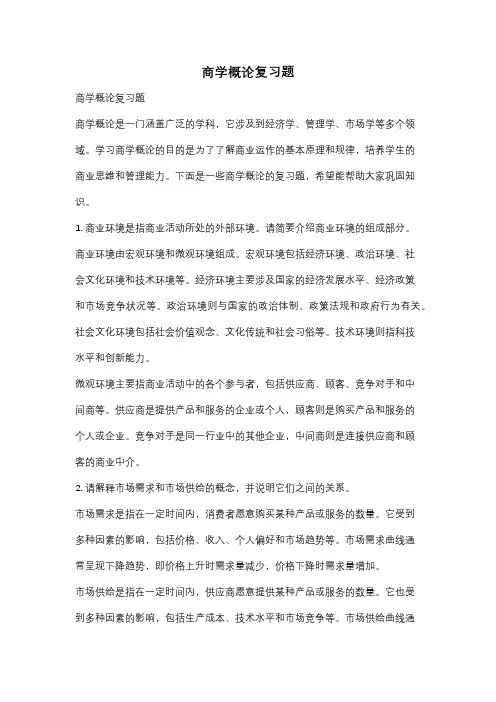
商学概论复习题商学概论复习题商学概论是一门涵盖广泛的学科,它涉及到经济学、管理学、市场学等多个领域。
学习商学概论的目的是为了了解商业运作的基本原理和规律,培养学生的商业思维和管理能力。
下面是一些商学概论的复习题,希望能帮助大家巩固知识。
1. 商业环境是指商业活动所处的外部环境。
请简要介绍商业环境的组成部分。
商业环境由宏观环境和微观环境组成。
宏观环境包括经济环境、政治环境、社会文化环境和技术环境等。
经济环境主要涉及国家的经济发展水平、经济政策和市场竞争状况等。
政治环境则与国家的政治体制、政策法规和政府行为有关。
社会文化环境包括社会价值观念、文化传统和社会习俗等。
技术环境则指科技水平和创新能力。
微观环境主要指商业活动中的各个参与者,包括供应商、顾客、竞争对手和中间商等。
供应商是提供产品和服务的企业或个人,顾客则是购买产品和服务的个人或企业。
竞争对手是同一行业中的其他企业,中间商则是连接供应商和顾客的商业中介。
2. 请解释市场需求和市场供给的概念,并说明它们之间的关系。
市场需求是指在一定时间内,消费者愿意购买某种产品或服务的数量。
它受到多种因素的影响,包括价格、收入、个人偏好和市场趋势等。
市场需求曲线通常呈现下降趋势,即价格上升时需求量减少,价格下降时需求量增加。
市场供给是指在一定时间内,供应商愿意提供某种产品或服务的数量。
它也受到多种因素的影响,包括生产成本、技术水平和市场竞争等。
市场供给曲线通常呈现上升趋势,即价格上升时供给量增加,价格下降时供给量减少。
市场需求和市场供给之间存在着相互作用的关系。
当市场需求增加时,供应商会增加生产以满足需求,从而导致市场供给增加。
相反,当市场需求减少时,供应商会减少生产,导致市场供给减少。
市场需求和市场供给的平衡点称为市场均衡,即市场上需求量等于供给量的状态。
3. 请简要介绍市场细分的概念和意义。
市场细分是将整个市场划分为若干个具有相似需求和特征的小市场的过程。
市场细分可以根据不同的标准进行,如地理位置、年龄、性别、收入水平和消费习惯等。
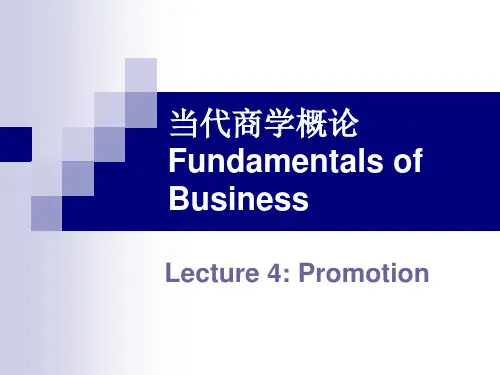
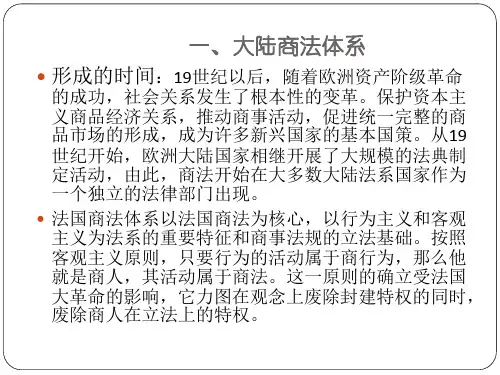
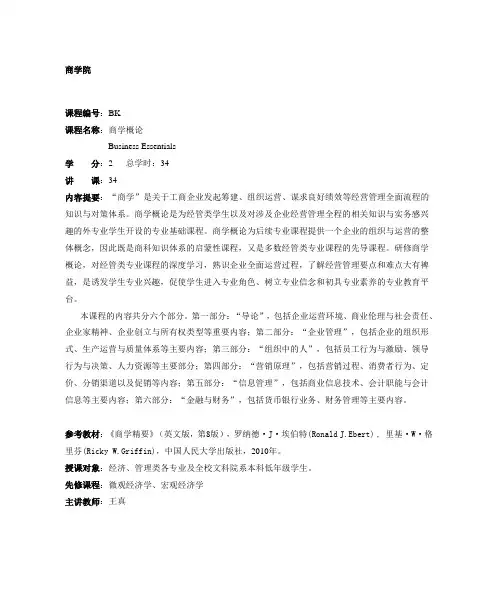
商学院课程编号:BK课程名称:商学概论Business Essentials学分:2 总学时:34讲课:34内容提要:“商学”是关于工商企业发起筹建、组织运营、谋求良好绩效等经营管理全面流程的知识与对策体系。
商学概论是为经管类学生以及对涉及企业经营管理全程的相关知识与实务感兴趣的外专业学生开设的专业基础课程。
商学概论为后续专业课程提供一个企业的组织与运营的整体概念,因此既是商科知识体系的启蒙性课程,又是多数经管类专业课程的先导课程。
研修商学概论,对经管类专业课程的深度学习,熟识企业全面运营过程,了解经营管理要点和难点大有裨益,是诱发学生专业兴趣,促使学生进入专业角色、树立专业信念和初具专业素养的专业教育平台。
本课程的内容共分六个部分。
第一部分:“导论”,包括企业运营环境、商业伦理与社会责任、企业家精神、企业创立与所有权类型等重要内容;第二部分:“企业管理”,包括企业的组织形式、生产运营与质量体系等主要内容;第三部分:“组织中的人”,包括员工行为与激励、领导行为与决策、人力资源等主要部分;第四部分:“营销原理”,包括营销过程、消费者行为、定价、分销渠道以及促销等内容;第五部分:“信息管理”,包括商业信息技术、会计职能与会计信息等主要内容;第六部分:“金融与财务”,包括货币银行业务、财务管理等主要内容。
参考教材:《商学精要》(英文版,第8版),罗纳德·J·埃伯特(Ronald J.Ebert) , 里基·W·格里芬(Ricky W.Griffin),中国人民大学出版社,2010年。
授课对象:经济、管理类各专业及全校文科院系本科低年级学生。
先修课程:微观经济学、宏观经济学主讲教师:王真BRIEF DESCRIPTION OF UNDERGRADUATE CURRICULA COURSE CODE:BKCOURSE NAME:Business EssentialsCREDITS:2CLASS HOURS:34(THEORETICAL EDUCATION:34 ,PRACTICAL EDUCATION:0 )ABSTRACT:Business is a set of knowledge and practice those which are involved with the process of business and management, respecting to business firm planning and starting up, operation and organization, excellent performance making. Business Essentials is a fundamental course for business school students and non-business major students those whom are interesting in the knowledge and practice toward to the process of business and management. Business Essentials as an initiative course provides a globalconcept of the enterprise for students to study following specialized courses. It is an important educational platform for students to acquainted with business operation, inspire their academic desire, make clear the key elements and issues in business practice, cultivate the professional quality.There are six parts in this course. Part Ⅰ: Introduction. It contains business environment, business ethics and social responsibility, entrepreneurship, start-up and ownership structure. Part Ⅱ: Business Administration. It contains organizational structure, operation and quality control. Part Ⅲ: People in Organizations. It contains employee behavior and motivation, leadership and decision-making, human resources. Part Ⅳ: Principles of Marketing. It contains marketing process and consumer behavior, pricing, distributing and promoting products. PartⅤ: Managing Information. It contains information technology for business, the role of accountants and accounting information. PartⅥ: Financial Issues. It contains money and banking, managing finances.REFERENCE:Business Essentials, Ronald J. Ebert and Ricky W.Griffin, Ren Min University Press, 2010.STUDENTS:business major students and art major students from all over the campus .PREREQUISITES:Microeconomics and MacroeconomicsTEACHERS:Wang Zhen, professor。
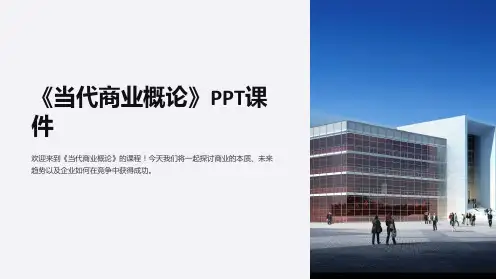
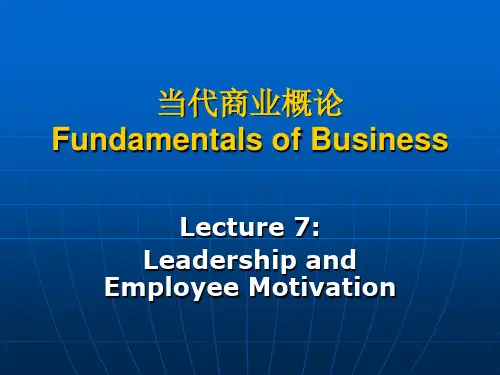
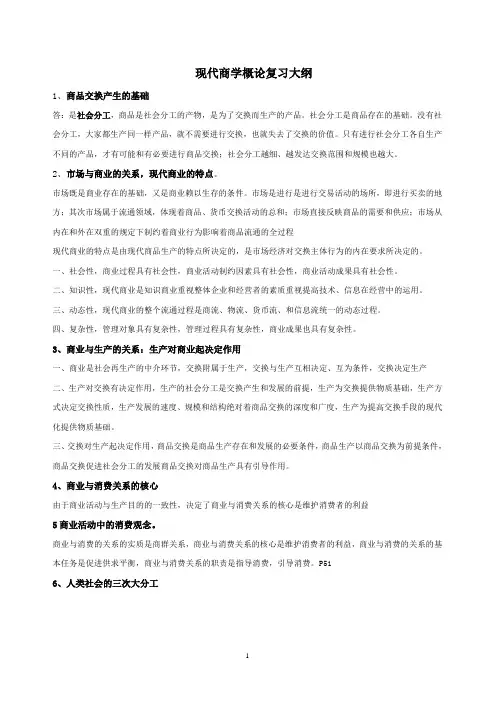
现代商学概论复习大纲1、商品交换产生的基础答:是社会分工,商品是社会分工的产物,是为了交换而生产的产品。
社会分工是商品存在的基础。
没有社会分工,大家都生产同一样产品,就不需要进行交换,也就失去了交换的价值。
只有进行社会分工各自生产不同的产品,才有可能和有必要进行商品交换;社会分工越细、越发达交换范围和规模也越大。
2、市场与商业的关系,现代商业的特点。
市场既是商业存在的基础,又是商业赖以生存的条件。
市场是进行是进行交易活动的场所,即进行买卖的地方;其次市场属于流通领域,体现着商品、货币交换活动的总和;市场直接反映商品的需要和供应;市场从内在和外在双重的规定下制约着商业行为影响着商品流通的全过程现代商业的特点是由现代商品生产的特点所决定的,是市场经济对交换主体行为的内在要求所决定的。
一、社会性,商业过程具有社会性,商业活动制约因素具有社会性,商业活动成果具有社会性。
二、知识性,现代商业是知识商业重视整体企业和经营者的素质重视提高技术、信息在经营中的运用。
三、动态性,现代商业的整个流通过程是商流、物流、货币流、和信息流统一的动态过程。
四、复杂性,管理对象具有复杂性,管理过程具有复杂性,商业成果也具有复杂性。
3、商业与生产的关系:生产对商业起决定作用一、商业是社会再生产的中介环节,交换附属于生产,交换与生产互相决定、互为条件,交换决定生产二、生产对交换有决定作用,生产的社会分工是交换产生和发展的前提,生产为交换提供物质基础,生产方式决定交换性质,生产发展的速度、规模和结构绝对着商品交换的深度和广度,生产为提高交换手段的现代化提供物质基础。
三、交换对生产起决定作用,商品交换是商品生产存在和发展的必要条件,商品生产以商品交换为前提条件,商品交换促进社会分工的发展商品交换对商品生产具有引导作用。
4、商业与消费关系的核心由于商业活动与生产目的的一致性,决定了商业与消费关系的核心是维护消费者的利益5商业活动中的消费观念。
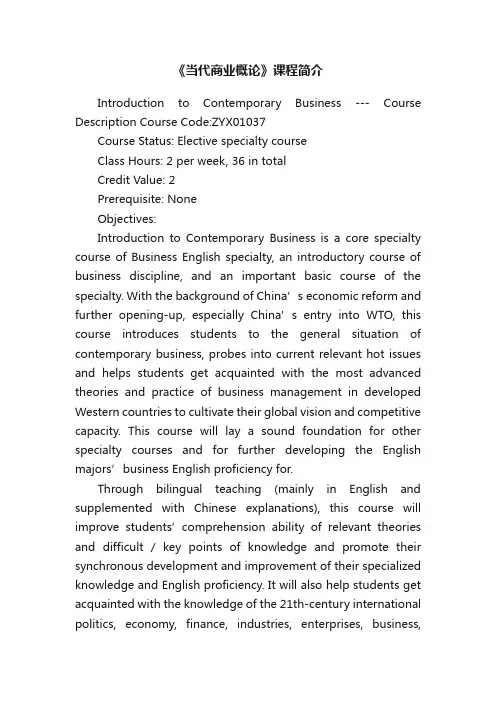
《当代商业概论》课程简介Introduction to Contemporary Business --- Course Description Course Code:ZYX01037Course Status: Elective specialty courseClass Hours: 2 per week, 36 in totalCredit Value: 2Prerequisite: NoneObjectives:Introduction to Contemporary Business is a core specialty course of Business English specialty, an introductory course of business discipline, and an important basic course of the specialty. With the background of Ch ina’s economic reform and further opening-up, especially China’s entry into WTO, this course introduces students to the general situation of contemporary business, probes into current relevant hot issues and helps students get acquainted with the most advanced theories and practice of business management in developed Western countries to cultivate their global vision and competitive capacity. This course will lay a sound foundation for other specialty courses and for further developing the English majors’bu siness English proficiency for.Through bilingual teaching (mainly in English and supplemented with Chinese explanations), this course will improve students’comprehension ability of relevant theories and difficult / key points of knowledge and promote their synchronous development and improvement of their specialized knowledge and English proficiency. It will also help students get acquainted with the knowledge of the 21th-century international politics, economy, finance, industries, enterprises, business,information, etc. and the fundamentals of enterprise management, human resource management, marketing, financial affairs, etc. to lay a sound foundation for the study of more microcosmic and more detailed courses and to further increase learners’business E nglish proficiency.Course content:1) American business environment2) Business ethics and social responsibility.3) Entrepreneurship, new ventures, and business ownership.4) Global business environment5) Enterprise management6) Enterprise structure7) Operations management and quality8) Employee behavior and motivation9)Leadership and decision making10) Human resource management and labor relation11) Principles of marketing12) Management information technology13) The role of accountants and accounting information14) Money and banking15) Financial managementCourse book:R.J. Ebert & R.W. Griffin, Business Essentials (8th ed.),China Renmin University Press, 2010.Reference book:1. Boone and Kurts, Contemporary Business (14th ed.), John Wiley & Sons Inc, 2011.2. Chen Zhunmin, Fundamentals of Business, Higher Education Press, 2002.3. Charles W. Hill, International Business (5th ed.), ChinaRenmin University Press, 2006.4. Karen Collins, Exploring Business, Posts and Telecom Press, 2010.01.5. W.G. Nickels, J.M. McHugh, & S.M. McHugh, Understanding Business (11th ed.), Tsinghua University Press, 2005.6. J. Madura, Introduction to Business (4ed.), Posts and Telecom Press, 2005.01.7. Zhouy Sanduo, et al, Management—Principles and Methods (4th ed.), Fudan University Press, 2003.11.8. Zhu Wenzhong, Introduction to International Business Management (English edition)(The 11th-Five-year-Plan Projected Textbook of Guangdong University of Foreign Studies), University of International Business and Economics Press, 2007.05. Assessment:The main assignments are extracurricular reading. Every student is to read at least two articles per week, about which they will write reviews or reports. At the end of the semester, everyone is to hand in a study paper-file in which are included class notes, articles of business (including their abstracts and comments on them), analyses of the questions after the texts and summery of study methods, etc.Examination will be held in the 18th week. Seventy percent of the examination content comes from the textbook, and thirty percent from other sources.Assessment of students’ accomplishment in this course consists of various forms. Forty percent of the total score comes from the final examination and sixty percent comes from other sources: attendance (5%), class performance (20%), assignments (20%) and presentation (15%).当代商业概论1 课程编码:ZYX010372 课程性质:专业选修课3 教学时数:2学时/周,总共36学时4 学分:2学分5 先修课程:无6 教学目标与内容(300-400字):《当代商业概论》是商务英语专业的专业主干课,是一门商科的入门课程,也是商务英语专业的一门重要专业基础课程。
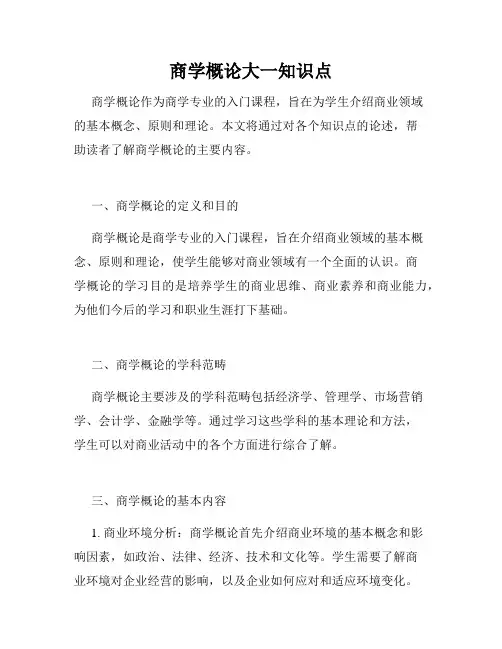
商学概论大一知识点商学概论作为商学专业的入门课程,旨在为学生介绍商业领域的基本概念、原则和理论。
本文将通过对各个知识点的论述,帮助读者了解商学概论的主要内容。
一、商学概论的定义和目的商学概论是商学专业的入门课程,旨在介绍商业领域的基本概念、原则和理论,使学生能够对商业领域有一个全面的认识。
商学概论的学习目的是培养学生的商业思维、商业素养和商业能力,为他们今后的学习和职业生涯打下基础。
二、商学概论的学科范畴商学概论主要涉及的学科范畴包括经济学、管理学、市场营销学、会计学、金融学等。
通过学习这些学科的基本理论和方法,学生可以对商业活动中的各个方面进行综合了解。
三、商学概论的基本内容1. 商业环境分析:商学概论首先介绍商业环境的基本概念和影响因素,如政治、法律、经济、技术和文化等。
学生需要了解商业环境对企业经营的影响,以及企业如何应对和适应环境变化。
2. 经济学基础:商学概论还会对经济学的基本概念和原理进行介绍。
学生需要了解供求关系、市场结构、价格理论等经济学的基本概念,并能运用这些理论进行商业活动的分析和决策。
3. 管理学概论:商学概论还会介绍管理学的基本理论和方法。
学生需要了解组织管理的基本原则和方法,如组织结构、领导力、决策-making决策和沟通等,以及管理实践中的相关问题。
4. 市场营销:商学概论中也会介绍市场营销的基本概念和原则。
学生需要了解市场营销的基本理论和方法,如市场定位、市场调研和市场推广等,以及市场营销策略的制定和实施。
5. 会计学概论:商学概论还会对会计学的基本内容进行介绍。
学生需要了解会计的基本概念和原则,掌握财务报表的基本分析方法,以及理解会计信息在决策-making决策中的作用。
6. 金融学概论:商学概论还会介绍金融学的基本概念和原理。
学生需要了解货币和金融市场的基本运作机制,以及金融风险管理和投资决策等相关内容。
四、商学概论的学习方法1. 多样化学习资源的利用:学生可以通过阅读教材、参与课堂讨论、查阅相关文献、观看相关视频等多种方式来加深对商学概论知识的理解和运用。
Chapter 11.Define business and profitsBusiness—-—-—An organization that provides goods or services to earn profitsProfits: The positive difference between a business’s revenues and its expenses rewards for businesspeople who take the risks2。
Distinguish between business and not—for—profit organizations •Business consists of all profit—seeking activities and enterprises that provide goods and services necessary to an economic system。
['entəpraɪz] 事业,项目Not—for-profit organizations are business like establishments (机构;团体;企业)that have primary objectives other than returning profits to their owners。
It operates in both public service and private sector (部门,行业,领域).3。
Identify the factors of production。
Labor, capital,entrepreneurs ([ˌɒntrəprə'nɜ:(r)]企业家),physical resources,information resources。
4. Global economic systemsPlanned economy,market economy and mixed economies•Planned Economy:➢An economic system in which the government owns and operates all sources of production•Market Economy:➢An economic system in which buyers and sellers interact ([ˌɪntər'ækt]相互作用;互相影响)based on freedom of choiceMixed Economies:Planned and Market•The economies of most countries include both planned and marketelements。